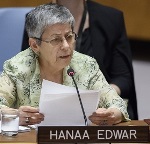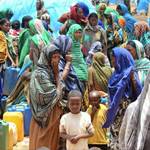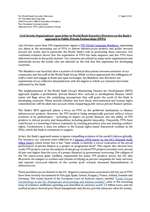Social Watch News
Published on Fri, 2018-06-08 14:12
Ms. Hanaa Edwar, Chairperson of Iraqi Al-Amal Association, participated at the UN Security Council Open Debate on the Protection of Civilians in Armed Conflicts that was held in New York, 22nd May 2018. Hanaa highlighted that civilians who have suffered must have access to justice and accountability. The Security Council Resolution in 2017 on Da’esh accountability, and the Joint Communique on the Reduction and Response to Sexual Violence in Armed Conflict signed in September 2016 are crucial documents and she urge to support their implementation. She said there must be accountability for all harm committed in Iraq by all parties to the conflict. Accountability should not be limited to some people and some types of violations. All civilians deserve redress for their suffering. This must be clearly linked to reconciliation efforts. |
Published on Fri, 2018-06-08 13:58
This year is set to be an important milestone in the arduous journey of climate migrants. The global community is now beginning to fathom the challenges of people displaced by events such as floods, storms and sea level rise that are partly fuelled by climate change. Natural disasters forced over 18 million people out of their homes in 135 countries just last year, according to a new global report released by Geneva-based Internal Displacement Monitoring Centre (IDMC). |
| Published on Fri, 2018-06-08 00:06 |
Published on Tue, 2018-05-29 18:07
Partnerships for Sustainable Development – inclusive and accountable or laissez-faire marketplace?Current conventional wisdom has it that partnerships are crucial for the success of the of the 2030 Agenda for Sustainable Development and the achievement of the Sustainable Development Goals (SDGs). However, the UN approach to engaging in stakeholder partnerships is rooted in pre-2030 Agenda practices and perspectives. It has been shepherded by UN offices mainly concerned with resource mobilization and often amounts to fitting UN development activities into a pipeline of bankable projects. |
Published on Sat, 2018-04-28 16:26
After two years of measuring for SDG implementation the emphasis has shifted from the pressure to develop a global indicator framework to the need for capacity development. This has generated a significant increase in interest in national statistical offices (NSOs) for data disaggregation, not only by income, gender and population group but also by municipal and neighborhood levels in an effort to ’leave no one behind’. The shift to implementation and capacity-building has also spawned a host of initiatives and partnerships, designed primarily to enable NSOs to integrate data from non-traditional sources, such as satellite imagery, mobile phones, and social media and scanning data. |
Published on Fri, 2018-04-27 00:00
Almost three years after the adoption of the 2030 Agenda at the highest level of the United Nations, the indicators to assess its progress are still being debated. The set of indicators around which there is agreed methodology and available data (known as Tier I in the insiders' jargon) shows a great degree of overlap with the existing indicators for the Millennium Development Goals (MDGs) and misses most aspects of the Sustainable Development Goals (SDGs) that make them transformative or represent a paradigm change. There are 93 indicators in Tier I of the SDGs (see Table 1), of which 42 are either identical to or an elaboration of (e.g., disaggregated by sex, etc.) the already existing MDG indicators. And some important MDG indicators, particularly those related to implementation, have been lost. |
Published on Tue, 2018-04-24 00:00
The inter-session climate talks under the UN Framework Convention on Climate Change (UNFCCC) will kick start in Bonn, Germany, from 30 April to 10 May. The two-week session will witness the convening of the meetings of the forty-eighth session of the Subsidiary Body for Scientific and Technological Advice (SBSTA 48), the forty-eighth session of the Subsidiary Body for Implementation (SBI 48) and the fifth part of the first session of the Ad Hoc Working Group on the Paris Agreement (APA 1.5). A key focus of the three bodies will be in making progress related to the completion of tasks concerning the implementation of the Paris Agreement (PA), known as the Paris Agreement Work Programme (PAWP). Various decisions regarding the modalities, procedures and guidelines necessary for the implementation of the PA are expected to be adopted later this year in December, in Katowice, Poland by the Conference of Parties meeting as the Parties to the PA (known as the CMA), which will also see the convening of the 24th session of the UNFCCC Conference of Parties, known as COP 24. |
Published on Fri, 2018-04-20 11:40
The Addis Ababa Action Agenda (AAAA) has defined the follow-up process for the Financing for Development process as well as the means of implementation of the 2030 Agenda for Sustainable Development. This includes assessing progress, obstacles, challenges as well as new and emerging topics of relevance, and “provide policy recommendations for action by the international community” (para. 131). At a side-event during the 2018 ECOSOC Forum on Financing for Development Follo-up, participants are invited to provide their insights into their assessment of previous FfD Fora, their link with other international processes, and discuss with participants about opportunities and challenges, also with view to the upcoming High-level Dialogue on Financing for Development of the General Assembly in 2019. The format of the side event will be highly interactive. After a short framing presentation, the moderator will facilitate active dialogue with a small panel of respondents and the audience. |
| Published on Fri, 2018-04-20 10:26 |
Published on Tue, 2018-04-17 15:40
Last October, more than 150 organisations signed a PPP Global Campaign Manifesto, expressing our alarm at the increasing use of PPPs to deliver infrastructure projects and public services around the world, and in particular the World Bank’s role in promoting these contracts. Our combined evidence shows that the experience of PPPs has been negative, and few PPPs have delivered results in the public interest. Our concerns are echoed by many more organisations and individuals across the world, who are alarmed by the risk that this represents for developing countries. |
SUSCRIBE TO OUR NEWSLETTER









